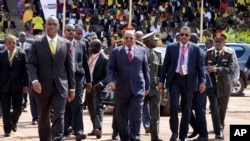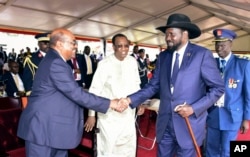Sudanese President Omar Hassan al-Bashir began a two-day state visit to Uganda on Thursday, in defiance of two international arrest warrants issued against the Sudanese leader by the International Criminal Court, or ICC.
Uganda is a member of the ICC, which means it is required to act on the arrest warrant.
Uganda is fully aware of this obligation, according to Fadi el-Abdallah, spokesman for the Hague-based court.
The ICC accuses Bashir of committing war crimes and crimes against humanity in the conflict in Sudan's western Darfur region, which has left more than 400,000 people dead and two million others displaced. The conflict continues to claim lives, according to Amnesty International.
But critics say Uganda is unlikely to arrest Bashir while the Sudanese leader is in the East African country. They contend Sudanese officials might have received assurances from the administration in Kampala that he will not be arrested, since it was Uganda that officially invited Bashir.
Local media quoted Ugandan President Yoweri Museveni as telling visiting heads of state, "We lost interest in the ICC. ... ICC is none of our business. It is a useless body. We had supported the ICC initially thinking they were serious ... but it is a bunch of useless people."
ICC keeping watch
ICC spokesman el-Abdallah says the court is following Bashir's visit.
Judges at the ICC have the power to determine if a state party to the Rome Statute has violated its obligation to cooperate with the court, after inviting the country to explain its decision not to act.
The United Nations Security Council could levy sanctions if the court determines a country has violated its obligation.
"Uganda is a state party to the ICC and thus has the obligation to cooperate with the ICC, including the implementation of an arrest warrant,” el-Abdallah said. “And with regards to Mr. al-Bashir, there have been two arrest warrants delivered by the ICC judges against him."
ICC critics
But critics in Africa accuse the ICC of unfairly targeting African leaders. Such critics contend that crimes against humanity are committed all over the world and, for the ICC to be taken seriously, it must follow up on all violations, not just those in African countries.
Bashir, who has ruled Sudan since a 1989 Islamist and army-backed coup, rejects the ICC's authority and has flouted the warrant before, traveling inside the Middle East and Africa.
He has also visited China and Indonesia, which are not ICC members, over the past year.
Some information for this report was contributed by Reuters.





